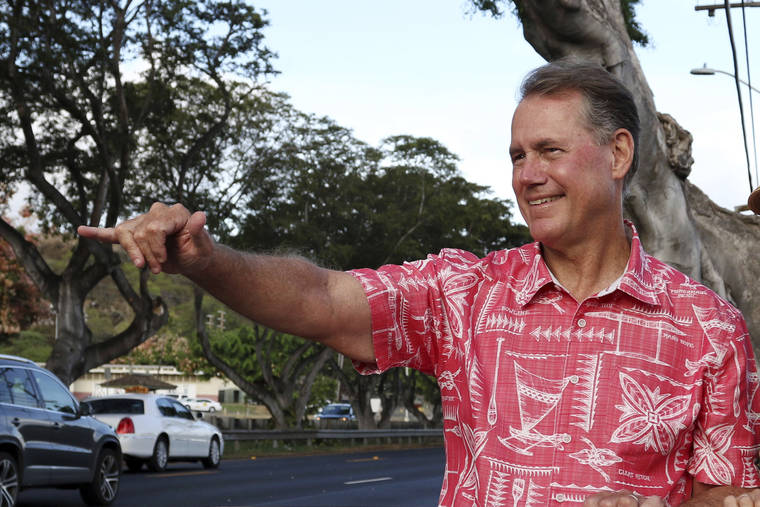Races for Congress top Hawaii’s ballot on Election Day

ASSOCIATED PRESS / JULY 2018
Ed Case greeted evening commuters while campaigning for the U.S. congressional seat representing urban Honolulu. Races for two seats in Congress top the ballot, today, in Hawaii.

ASSOCIATED PRESS
State Sen. Kai Kahele at the opening day of the Hawaii State Legislature, Jan. 15, in Honolulu. Races for two seats in Congress top the ballot, today, in Hawaii.


Races for two U.S. House seats top the ballot today in Hawaii.
Democratic State Sen. Kai Kahele and Republican Joe Akana are vying to succeed U.S. Rep. Tulsi Gabbard, who did not run for re-election and instead chose to focus her energy on an ultimately unsuccessful campaign for president.
If elected, Kahele and Akana would each be the second Native Hawaiian to serve in Congress since statehood. The seat they seek represents suburban Honolulu and islands other than Oahu.
Kahele is an advocate of “Medicare for All” and supports the idea of a Green New Deal to address climate change and help Hawaii meet its clean energy goals.
Kahele has served in the state Senate since 2016, when he was first appointed to fill the remainder of his father’s term after he died. He was elected for the first time later that year.
Akana is a former U.S. Air Force intelligence analyst and businessman. He has a master’s in business administration from Hawaii Pacific University and a master’s in strategic intelligence from National Intelligence University.
Don't miss out on what's happening!
Stay in touch with breaking news, as it happens, conveniently in your email inbox. It's FREE!
In the race to represent urban Honolulu, incumbent U.S. Rep. Ed Case faces Republican Ron Curtis.
Case, a Democrat, was first elected to the seat two years ago. He represented Hawaii’s other congressional district from 2002 to 2007 and served in the state House from 1994 to 2002.
He has been an attorney for Outrigger Hotels and Resorts and worked at multiple law firms.
Curtis is a retired engineer. He ran unsuccessfully for U.S. Senate against U.S. Sen. Mazie Hirono in 2018.
In the presidential race, Democrat Joe Biden was expected to win Hawaii over incumbent President Donald Trump in the heavily blue state. Biden served eight years as vice president for Hawaii-born President Barack Obama.
Today’s ballot marked Hawaii’s first all-mail general election.
A record 407,190 voters cast ballots during the August primary, the first time the state used all-mail voting. They accounted for 51.2% of registered voters, the highest percentage to vote in a Hawaii primary election since 1996.
In the 2016 primary, 252,725 voters — or 34.8% of registered voters — cast ballots.
Hawaii voters also had the option of casting their ballots in person at a select few voter service centers in the weeks leading up to the election. Only about 5,000 people voted this way during the primary.
Democratic Gov. David Ige signed legislation switching the state to a vote-by-mail system last year before the coronavirus pandemic struck. Hawaii was the fifth state to adopt all-mail voting after Colorado, Oregon, Utah and Washington.

 Stay updated on Hawaii and national elections coverage
Stay updated on Hawaii and national elections coverage


